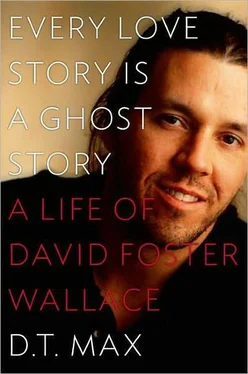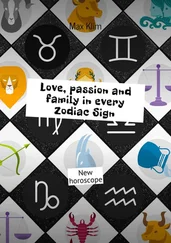The week that Wallace mailed off the full Brief Interviews with Hideous Men manuscript to Pietsch, the Poags invited him to dinner to meet a woman. Nearing thirty-seven, Wallace felt ready for a change. The birth of his sister’s first child in February had reminded him he was no closer to the alluring stability of family life. Writing Brief Interviews had also shaken him up. The book, he told friends, had made him look at aspects of himself he didn’t find very appealing. He had recently broken up with yet another girlfriend and wrote a friend that he felt like he had been through the experience so many times by now that it left him dispirited—“not about the thing not working out but low vis a vis DFW and his existential state.”
Wallace had told the Poags he wanted to be with either a nurse or a social worker, and the woman they invited, Juliana Harms, worked for the Department of Children and Foster Services. For Wallace the meeting was a date, but the Poags told Harms Wallace was interested in interviewing her for some work he was doing, which, given Wallace’s hunger for material, was also true. Wallace was an inveterate interviewer. He went to a tire factory, trailed an exterminator, and even had watched Francis B. propose to his girlfriend. Now the foursome had Chinese food for dinner and sat on the Poags’ front porch afterward. From across the street they heard a baby’s cry: Harms tensed up. “That’s not normal,” she said. When the baby calmed down, so did she. Wallace was impressed.
Soon they met again, and before long the pretense of an interview was gone and they were seeing each other. Harms was more like Susie Perkins than like the women Wallace had dated over the past decade; she was not depressed, nor did she have a history of drug or alcohol problems. She had liked Girl with Curious Hair but most of all remembered looking at the picture on the back, taken when Wallace lived in Somerville, and thinking, “User”—a drug abuser. Wallace was fascinated by her job, which included entering houses under police protection to remove endangered children, and pressed her for every detail about how she did it.
Immediately, Wallace had wanted to go to bed with her. This was how he usually dated. Harms resisted, though; so instead they would go for long walks; she lived in an apartment on the other side of town from him. They spent hours talking into the night. She loved Kokopelli, a Hopi trickster and fertility god. He had a large one on his wall. The Oxford English Dictionary held pride of place on the shelves in his living room. On the first birthday of hers that they celebrated together, a month after they met, Wallace gave Harms the two-volume version, with, as she remembers, “salivating excitement.” They became involved. Wallace’s “Mary” tattoo had faded over the years. “Who’s Marv?” they would joke.
Wallace was in a “post-partum funk,” as he called it, after finishing Brief Interviews . The Drone was sick with lymphoma and despite a course of chemotherapy was not getting better. “I’ve been going around crying like a toddler at the prospect of him suffering or dying,” he wrote Brad Morrow. Harms helped him through these difficult moments. In November Wallace took her to Jamaica. The gesture was a counterphobic one — he hated travel, and tourism even more. But Wallace saw a chance to start afresh, a way to slough off his own hideousness. The couple arrived at the Beachcomber Resort in Negril. They swam together, Wallace lulled by the promise that there could be no sharks so close to shore in the Caribbean, and ate spicy food and walked on the beach, where, attracted by his long hair, marijuana sellers swarmed him. “They always come to the addict,” he said. But as often as he could, Wallace barricaded himself in the coral pink bathroom to write. Never liking to be without a project, he had started on a long essay on language which was giving him the usual trouble. “We snorkeled,” he wrote Franzen in quiet panic on his fifth day at the resort, “Juliana got menaced by a sting ray. She is easy to be with, and that’s good, because except for the 2 hours a day I flail away (futilely) on the usage article, we’re together all the time.” Harms was surprised to find that her new friend locked the door to work even when he was alone.
Back in Bloomington, Wallace settled down to his article. The piece was tied to the publication of a new dictionary of American usage, but he wanted to write about the function of language more broadly, what it really meant to speak of “a common language.” Grammar, he saw, was agreement, community, consensus. “Issues of usage, looked at closely even for a moment,” he wrote DeLillo, “become issues of Everything — from neurology to politics to Aristotelian pisteis to Jaussian Kritik to stuff like etiquette and clothing fashions.” Not surprisingly, as soon as he opened himself up to such vast considerations, Wallace found himself overwhelmed: “Every argument seems to me to sprout several potential objections, each of which feels like it has to be handled or the whole argument falls like a pine.” He invoked an image from Faulkner that writing a novel was like building a hen coop in a hurricane and asked DeLillo to remind him never to do nonfiction again. “The whole thing needs to end,” he added.
The relationship with Harms continued to go well. She got him to cut his hair for the first time in a year and they went to the office Christmas party for the Department of Children and Foster Services, Wallace wearing one of her plastic tortoiseshell headbands. Drone died in mid-December. Wallace held his dog in his arms and cried as the veterinarian gave a lethal injection. The body could not be cremated for three weeks and so he would go by the veterinary office and sit outside the freezer where his dog lay. He sent DeLillo a holiday card with the emendation, “It is a sad Christmas.”
Again Harms was there to comfort him. Wallace asked Harms not to fly in winter; he was afraid of losing her in a crash. Soon Harms moved into his house at the edge of town, bringing her cat. They bought a king-sized bed, because the old one was too small. The two shared corny pop songs they loved, like Edwin McCain’s “I’ll Be Your Crying Shoulder.” (Wallace boasted he had the musical taste of a high school girl.) He bought her expensive gifts, happy that the books and the fellowships had made him well-to-do. The couple got engaged and picked out a setting for their rings. They talked about having a child and agreed that if Harms got pregnant they would be pleased.
But there were issues. Harms wouldn’t let him use a pen on the couch. He was allergic to her cat. She would come home from work and zone out. He worked all day on his fiction. 9At Harms’s urging, Wallace checked himself into an addiction center in Pennsylvania to try to get off nicotine entirely. He had been at various times a smoker, a tobacco chewer, and a patch user — sometimes all three in quick succession — since graduate school. 10The stay lasted more than a week, and Wallace came home highly agitated. He wished he had a major project under way; he wished he were smoking. He wondered about the Nardil. He never felt quite himself on it. It left him somehow slightly detached from reality. He had in recent years, he believed, become hypoglycemic too, and so his historic diet of prepackaged blondies was replaced by sugarless jelly spreads.
Wallace had managed to keep television at bay for many years now, but in order to relax after her grueling days, Harms ordered satellite TV service with, as she remembers, 75 channels. Wallace would sit and click through the stations, landing on one, then moving on to the next, always afraid he was missing something better and so really watching nothing. By now, between the loss of The Drone, the availability of TV, the lack of nicotine, and the scarcity of privacy, he was stupefied. But he was engaged and committed to Juliana.
Читать дальше












